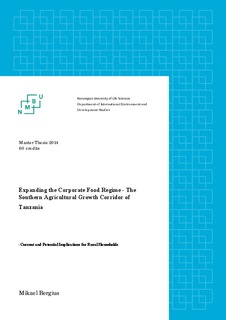| dc.description.abstract | It is widely agreed that agriculture will remain a key foundation in efforts to reduce poverty, achieve food security and improve the environment worldwide. However, what type of agricultural development that is best suited to achieve these multiple aims is debated. Some argue for an expanded role of multinational agribusiness corporations in partnerships with governments, while others call for a radical transformation of the agri-food chain by reembedding control over agriculture in small-scale farms and communities. A range of coordinated initiatives currently underway involving agribusiness corporations, governments and development institutions indicates that the former approach is emphasized. I claim that this approach represents an expansion of a specific structure of production, distribution, and consumption within the agroecosystem known as the corporate food regime.
My overall objective in this thesis has been to critically engage with this approach to
agricultural development. Based on qualitative research undertaken in Tanzania during the fall of 2013 I have applied the concept of the corporate food regime to the analysis of the Southern Agricultural Growth Corridor of Tanzania (SAGCOT). I argue that SAGCOT
represents an expansion of the corporate food regime in the country. Two broad conclusions can be drawn from the analysis: Firstly, while small-scale farmers are presented as the main beneficiaries of SAGCOT, their participation in setting up the initiative have been negligible. Instead SAGCOT is formed through the vision of corporations and reflects their aspirations to enhance their control over African agriculture. Secondly, SAGCOT risk facilitating a subsumption of Tanzanian agriculture to global capital and may thus signify a “control grab” whereby small-scale farming households risks surrendering their autonomy and rights to land and other vital resources. Current land acquisition processes in which the Tanzanian government seeks to acquire land for SAGCOT investments are found to be fraught with violations of the rights of small-scale farmers and pastoralists.
Against this background, I present an alternative path which recognizes small-scale farmers, and the knowledge they possess, as the driving force of agricultural development. This alternative is expressed by the interlinked language of agro-ecology and food sovereignty and entails an agricultural sector connected to local natural resources and knowledge, whereby farm management and control over essential farm inputs are embedded with farmers themselves instead of with global capital. | nb_NO |
